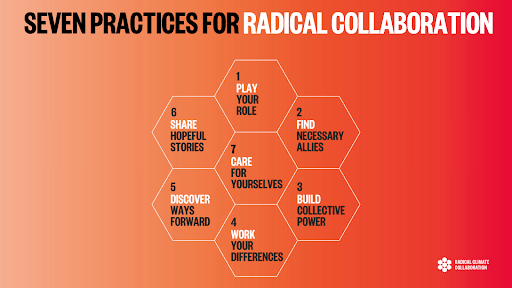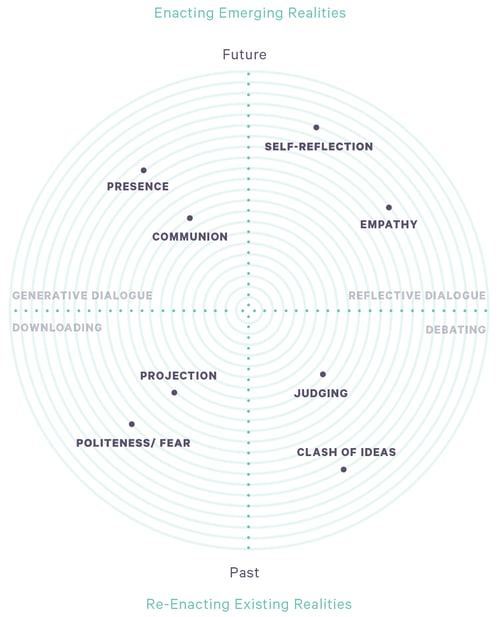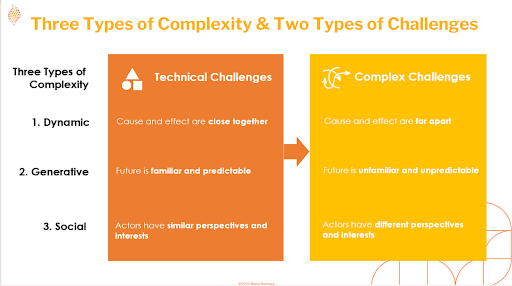Building effective radical collaboration to address the climate crisis
Reos Partners
March, 2024

Category
Topics
The world has been witnessing a rise in extreme weather events. The global temperature is projected to increase by 1.5 degrees Celsius within this decade, according to a report published in the Journal of Oxford Open Climate Change. This highlights the critical need to take immediate action to curb the catastrophic impacts of global warming.
As we approach the midpoint of the decisive decade, it has become increasingly clear that collaboration is essential to tackle the climate crisis. Leading organisations, businesses, institutions, and governments must step up and take action. This requires a collective effort, as no single entity can solve this monumental issue alone. By working together, we can identify innovative ways to reduce our carbon footprint, develop sustainable practices, and implement policies that prioritise climate solutions.
Reos Partners' work with global climate collaborations has helped us notice a recurring pattern of work getting stuck. Although the participants are willing to collaborate, they often fail to do so effectively. This realisation inspired our team to gather insights from leading collaborators in the climate space and distill these learnings into the framework for radical collaboration.
Building alliances with radical collaboration
Addressing climate change is a complex challenge that goes beyond individual efforts. The goal of achieving a net-zero future cannot be accomplished by any single person or organisation alone.
There are no simple answers to the complex global crises we face today, but Nikhil Dugal, a senior consultant with Reos Partners, believes the only way to find solutions is to bring together diverse groups of people committed to making progress, stating that “effective alliances produce better results.”
In this interview, Nikhil shares how radical collaboration can be applied to navigate the complexities of the decisive decade by working together across differences to move forward with speed, scale, and justice.
What is the radical collaboration approach, and how does it improve the way entities may work together?
ND: Radical collaboration is a pragmatic and proven set of practices to work together across differences to move forward with speed, scale, and justice. This framework is designed for those engaged in collaboration and helps build effective alliances with diverse groups to produce better results. It is radical in the sense that it gets to the root of the challenge of collaborating. The framework can help entities work together more effectively by providing a set of practices to follow when they face their most persistent collaboration challenges.
Radical collaboration consists of seven interconnected practices that, when applied together, are intended to produce movement and learning and, therefore, the potential for fast, big, and fair results.

The seven practices for radical collaboration (source: Radical Climate Collaboration Initiative)
- Play your role: Individuals assess their roles in collaboration, bringing in both intellect and emotion.
- Find necessary allies: Seeking allies with shared goals and diverse skills is crucial, akin to building a powerhouse team.
- Build collective power: Cultivating collective power involves combining everyone's assets for systemic change.
- Work your differences: Embracing differences and navigating disagreements is key for smooth collaboration.
- Discover ways forward: Exploring uncharted territories with a mindset of disciplined experimentation is advised.
- Share hopeful stories: Sharing hopeful stories collectively acts as a motivational fuel.
- Care for yourselves: Taking care of oneself is emphasised, acknowledging the challenges in dealing with issues like climate crises.
These seven practices are a holistic guide to effective, sustainable collaboration. For more information on these seven practices, download our guidebook.
It can be difficult for groups to get organised and forge a path forward. Of the 7 practices of radical collaboration, do you think there’s any one practice that many groups struggle with? How can they overcome this?
ND: One primary challenge most collaborations face is understanding how to work with their differences. Different stakeholders often bring different perspectives and experiences to each challenge, and they often fail to leverage this difference as an asset for their collaboration.
One way to overcome this is to notice how we are engaging in dialogue and how we are listening to others as they share their experiences and perspectives. The practice of engaging in reflective and generative dialogue and understanding what mode we are engaging in can help clarify the quality of our conversation.

A graphic illustrating The Four Ways of Talking and Listening. Source: Flip the Clinic
How can radical collaboration resolve conflicts across stakeholders and others involved in climate action?
ND: The practices of radical collaboration are derived from the successes and failures of other collaborators in the climate space. This approach can help collaborations function more effectively by ensuring they understand where they sit in the system, who should be involved, what role participants play, how they should leverage their strengths, and how they work experimentally, systemically, and collaboratively to create change.
Multi-stakeholder initiatives for effective climate collaboration
What metrics or indicators can we use to determine if our collaboration is effective, especially when it comes to climate action?
ND: While the cumulative impact of a collaboration is long-term, it is possible for us to see the effectiveness by monitoring the quality of the multi-stakeholder partnership in the short term. This includes developing a strong learning practice of collecting feedback from collaborators on their experience engaging in the work.
A multi-stakeholder approach is essential for implementing change at scale. What are examples of Reos’ projects that employed radical collaboration, and what improvements or achievements were made?
ND: A few project examples come to mind. First, Reos partnered with RMI on e-Lab, an initiative driving transformation in the electricity sector. e-Lab was established to convene leading energy experts to tackle key challenges at the forefront of the energy transition. e-Lab convenes key players to address the complexity of the electricity sector's competing motivations, extensive regulation, and information asymmetry in order to shift the industry's trajectory. The engagement within e-Lab embodies the principle of playing one's role effectively by recognising that strategically aligning the key players, who hold different roles, is necessary to navigate and overcome the challenges inherent in reshaping the electricity landscape.
This next example illustrates the radical collaboration practice of how to find necessary allies. Here, Reos supported the Bhavishya Food Alliance's mission to address childhood malnutrition. This project brought together unconventional partnerships, including the government, businesses, and civil society. By actively seeking unconventional partnerships, the alliance demonstrates its commitment to finding necessary allies across diverse sectors. This collaborative effort reflects the understanding that addressing complex issues, such as child malnutrition, requires the collective expertise and resources of stakeholders from various domains, contributing to creating meaningful and sustainable solutions.
Reos’ work with the Clean Energy Buyers Association (CEBA) is a good example of the practice of building power together. CEBA is focused on advancing the decarbonization of the electricity sector and unlocking markets for communities of customers to collectively embrace clean energy solutions. By promoting collaboration among clean energy buyers, the association aims to drive positive change in the energy landscape, contributing to the broader goal of reducing carbon emissions and promoting sustainable practices within the electricity sector. This aligns with the practice of building power together, as it emphasises the strength derived from collective action and collaboration to achieve broader goals, such as reducing carbon emissions and promoting sustainability within the electricity sector.
These are just a few examples of Reos’ work that demonstrate how radical collaboration practices provide a roadmap to build effective alliances.
What is the role of upskilling those currently in leadership positions - in these co-design approaches?
ND: Upskilling the capacity of leaders to collaborate effectively is a big part of the work. There are some key skill sets around facilitating effectively, as well as working collaboratively, systemically, and creatively in order to be able to create change. We apply a systems leadership approach that involves building strong relationships, cultivating a shared vision and purpose, and working collaboratively to identify and address systemic issues. A systems leader needs to be flexible, adaptable, and responsive to changing circumstances, as well as willing to learn from failures and feedback.
Building systems leadership capacity helps leaders comprehend the complexity of the systems they operate in and how different parts of the system are interrelated. This understanding can enable leaders to identify opportunities for collaboration and work together toward achieving common goals. With a shared vision and a collaborative mindset, leaders can create and implement innovative approaches that address complex challenges. Ultimately, upskilling leaders can help foster a culture of collaboration and drive positive change.
Taking action with radical collaboration
Can the radical collaboration approach be used in another focus outside climate change?
ND: Yes, while these practices are derived from the experiences of climate collaborators, they are also applicable to others trying to work in complex multi-stakeholder collaboration work. Following these practices can increase the likelihood that your collaboration will succeed.
What advice would you give communities or organisations that want to embark on a journey of radical collaboration for climate action?
ND: My advice would be that collaboration is not simple or straightforward. Those who think it is are often surprised, which causes them to give up. However, collaboration is necessary if we are going to tackle the challenge of climate change.
The first step is understanding what role your collaboration plays in the ecosystem and what role each actor plays in the collaboration. It is also necessary to build the capacity for system leadership to act for the whole system and design for the different types of complexities we see with complex challenges.

This matrix describes the relationship between dynamic, generative, and social complexities related to technical and complex challenges. (Source: Reos Partners Facilitating 101 Workshop)
Radical collaboration: Driving transformative and sustainable results
The issue of climate change is complex and interconnected, going beyond individual limitations. Achieving a net-zero future is a shared goal that cannot be achieved by any one person or organisation alone. Prioritising transformation, trust, collaboration, and shared experiences are crucial on this collective journey toward a sustainable future.
Radical collaboration acknowledges the interconnectedness of our efforts and aims to co-design solutions with diverse stakeholders. Through this collaborative synergy, solutions emerge, becoming more comprehensive and resilient because they are shaped by collective wisdom and shared commitment.
Radical collaboration is a practical and effective method of working together to achieve results, particularly when it comes to addressing complex challenges like climate change. This approach emphasises the importance of collaboration across differences, prioritising relationship building and equity to drive systemic change. By working together with speed, scale, and justice, radical collaboration helps to achieve transformative results that are both effective and sustainable. This approach offers a roadmap to drive systemic change, making it a powerful tool for tackling the most pressing challenges of our time.
 About Nikhil Dugal
About Nikhil Dugal
Nikhil is energised by using systems thinking to help diverse teams work together on complex, intractable challenges. His role at Reos Partners includes designing and facilitating whole system teams to help create transformative change and evaluate its impact. He is also involved in designing an evaluation approach to systems change work based around the intersection of theoretical models of technological change and the lived experience of groups practicing this work. He advocates systems thinking and draws from a diverse set of experiences in financial inclusion work, as well as being a former social entrepreneur in the sustainability space. He has worked in India, the US, and the UK.


